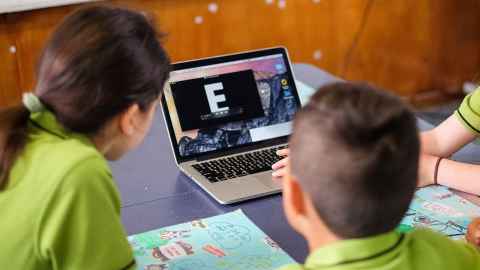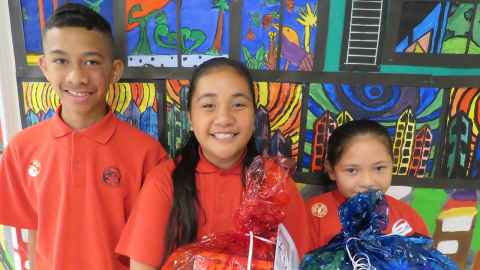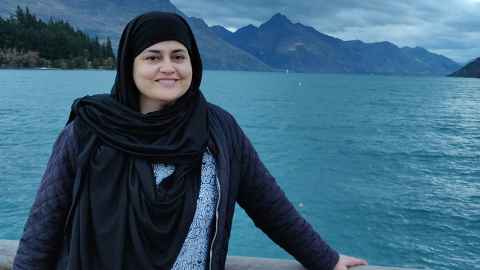Locked down but not locked out of learning
16 November 2020
Throughout Covid-19, a cluster of 12 low-decile schools with an emphasis on digital literacy have highlighted the importance of digital learning being accessible to all Aotearoa New Zealand students.

While some families and students have managed a relatively frictionless transition to online learning this year, Covid-19 has highlighted and exacerbated already-existing issues of inequity in the education system.
It became crucial for New Zealand school students to have access to digital devices and WiFi for any hope of uninterrupted learning during the global pandemic.
While many schools struggled with the transition, those with an existing emphasis on digital learning environments were more equipped than others to make the move. In this category were the Manaiakalani programme schools, a cluster of 12 low-decile schools designed with an emphasis on the importance of digital learning environments being accessible for all.

Anne Sinclair, a Manaiakalani Digital Teacher Academy supervisor, says Manaiakalani schools didn't have to deal with the access issues that other schools and students had over the lockdown periods, which allowed for uninterrupted learning throughout the time away from the physical classroom.
“The Manaiakalani programme is predicated on every child and household having access to WiFi and a learning device, with devices subsidised and purchased by each family at an affordable rate," says Anne.
Students found this transition out of the physical classroom quite easy as it was the same self-directed online learning structure they were used to doing every day.
Not only were there no access issues for the 85 Manaiakalani schools (many of which are based in rural areas of New Zealand), but the children are used to a self-directed style of learning, she says.
“Each classroom in the Manaiakalani programme has a learning site where the learning for the week takes place. At the beginning of the week, the kids to log into the site to see what they will be focusing on for the week.
"There is an emphasis on self-directed learning which allows every student to work at their own pace. It also gives the teachers more time to focus on helping kids who are struggling while the others get on with their work.
“When lockdown came about, it was really no different in the way the kids were already being taught. The teachers said, ‘Okay, we will continue learning from the site, as you have been doing, the only difference is that you won’t be physically be coming into the classroom. Instead we will have online catch ups and I'm here to help you online whenever you need.’
“Students found this transition out of the physical classroom quite easy as it was the same self-directed online learning structure they were used to doing every day. The way our schools are set up worked in our favour, as our kids didn’t lose any learning time," says Anne.
At the end of each day, the teacher would check up on the students to ask how their day went, what they learnt and read the children’s individual blogs, which they keep as a part of the programme, which enables transparency in the learning process.

Since 2012, the Woolf Fisher Research Centre, based at the University of Auckland’s Faculty of Education and Social Work, has been evaluating and providing feedback to the Manaiakalani Programme; collecting data which includes school measures of achievement for reading comprehension, writing and mathematics.
So far, evidence has found significant acceleration for students in Years 4 to 10 when tracked over three years, especially in writing. If a student was continuously present in a Manaiakalani school, their rate of improvement in writing was twice of the national expectation.
Lockdown help
During the first Covid-19 lockdown, it was the University's turn to call on the Manaiakalani Education Trust for help. Because of lockdown restrictions, many teaching students were left in the lurch and unable to complete their previously planned practicums.
Acknowledging the teaching students’ desire to get in the classroom over lockdown, the University issued a request to the Manaiakalani Education Trust to design a creative solution to a digital practicum experience, which would also meet the Ministry of Education’s learning objectives.
“Covid-19’s first lockdown completely ripped apart any idea of a practicum and so we got together and talked about how we could do something virtually. Because all of our schools work from a learning site, we realised okay, this actually seems workable,” says Anne.
Covid-19’s first lockdown completely ripped apart any idea of a practicum and so we got together and talked about how we could do something virtually.
Once everything was sorted, Faculty of Education and Social Work student teachers joined their associate teachers in their virtual classrooms and were tasked with designing a mathematics intervention for the kids.
Graduate Diploma in Teaching (Primary) student, Cheryl Ann Aviet spent her digital practicum experience online at Owairaka District School designing a maths intervention and interacting with year 5 and 6 students.
“There were a few teething problems, but I got over it in due course," says Cheryl. "The sessions were very interactive, informative and enjoyable. We got to experience a lot of different things while sitting at home before we actually entered the physical classroom. Overall, it was a great learning experience with lots to take in."
Sunilla Naik, a Graduate Diploma in Teaching (Primary) student who completed her virtual practicum experience at Point England School with year 4 and 5 students, shared the same sentiment.
There were a few teething problems, but I got over it in due course. The sessions were very interactive, informative and enjoyable.
“It was a learning experience for me as it was something new and interesting. I enjoyed creating a digital component along with my fellow group members.
“Our associate teacher, Hannah, was extremely helpful and understanding when we told her we were all newbies to Google Sites. She introduced me to her class and informed the children about the maths site we made for them," says Sunilla.
After lockdown, Sunilla went and physically visited the school where she had undertaken her virtual practicum experience to meet the associate teacher and children she interacted with online.
“While I enjoyed the virtual experience, I really liked being in a classroom after a long gap and was glad to see the children were comfortable having me around. It was great to see many students enjoying surfing the maths site," says Sunilla.
Media contact
Julianne Evans | Media adviser
Mob: 027 562 5868
Email: julianne.evans@auckland.ac.nz
Content writer: Zita Featherstone
Email: z.featherstone@auckland.ac.nz